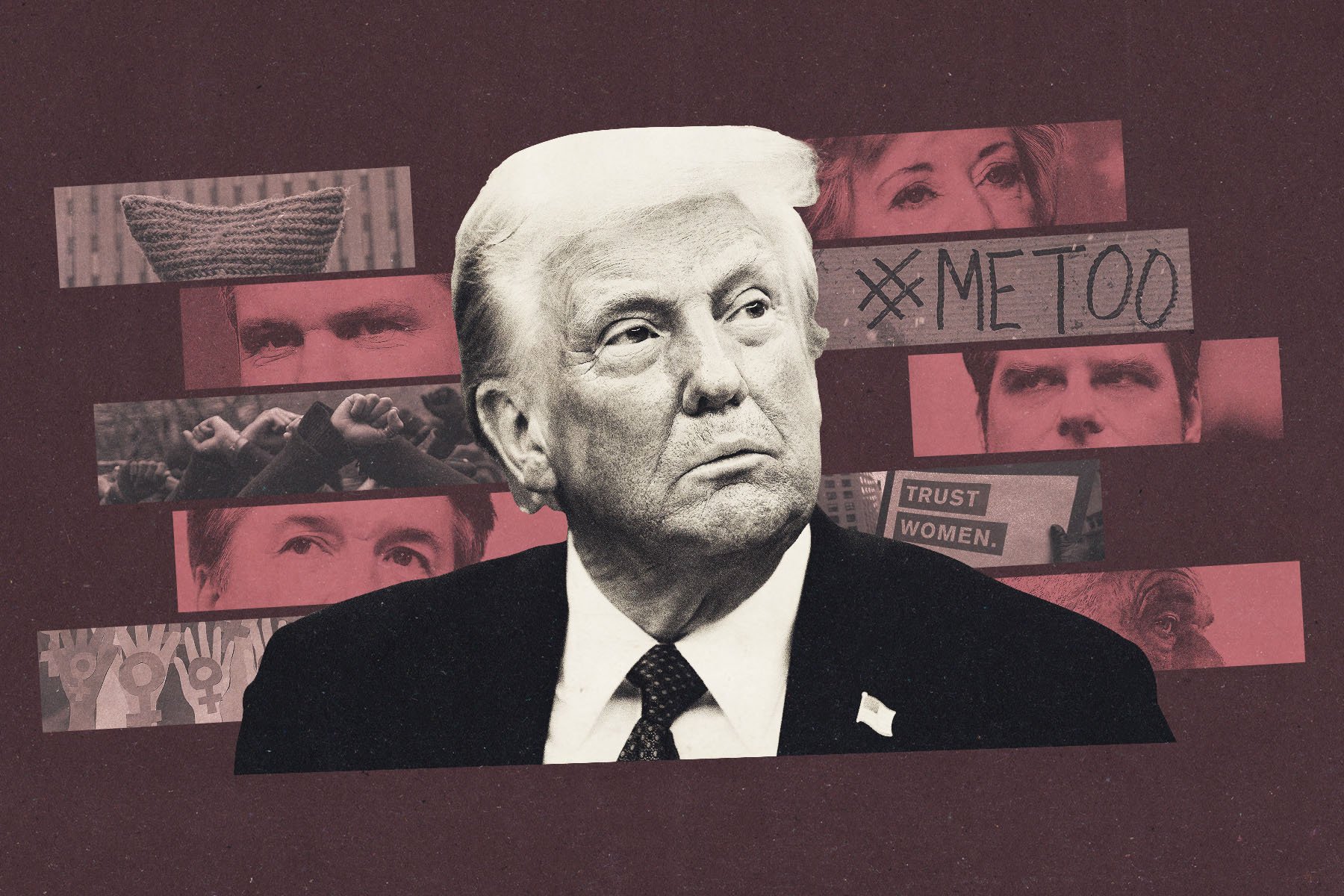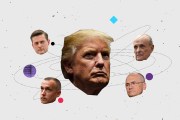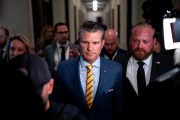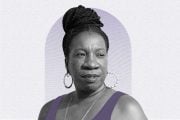President Donald Trump’s pick for defense secretary reached a confidential settlement with a woman who accused him of rape. His choice to lead the Health and Human Services Department has admitted to many “skeletons” in his closet, including in his dealings with women. His education secretary nominee — who also served in his first administration — is being sued over allegations that the organization she once led turned a blind eye to sexual abuse.
And the man who appointed them, who was accused during his first presidential bid of sexual misconduct by a number of women, has been found liable of sexual abuse by a jury since he was last in power.
Eight years ago, Trump’s first election helped ignite a reckoning for powerful men in Hollywood, the business world and politics, bringing sexual violence to the forefront of the national conversation. His return to the White House signals a cultural shift more reflective of the aggressive view of masculinity Trump ran on.
After 2016, Congress and state legislatures passed new laws addressing workplace harassment and strengthening protections for survivors. The phrase “believe women” was invoked, an attempt to reverse generations of doubting accusers. Some men were found guilty; some lost their jobs.
All the way, a cultural backlash to the movement known as #MeToo was taking hold. It was on display Monday, when Trump again took the oath of office. Justice Brett Kavanaugh, who was confirmed in 2018 amid accusations of sexual misconduct (which he denied), swore in Vice President JD Vance. Cultural figures like the YouTuber Jake Paul, who has been accused of sexual assault (he has denied the allegations), and Conor McGregor, the Irish mixed martial arts fighter whom a jury ordered to pay over $250,000 to a woman who accused him of “brutally” attacking her, attended in an overflow room. It’s also manifesting in the president’s picks for top Cabinet positions.
The GOP-controlled Senate this week is poised to confirm Pete Hegseth, Trump’s nominee for secretary of defense and one of several who have been publicly accused of or linked to allegations of sexual misconduct. In his confirmation hearing last week, Democrats pressed Hegseth on his settlement with a woman who had accused him of raping her in 2017. Hegseth, who was never charged, maintained that the encounter was consensual and that he was falsely accused.
Advocates for survivors of sexual assault point to the backlash against #MeToo — and place Trump at the center.
-
Read Next:
“It is an intentional effort to roll back the progress made over the last few years, peaking, really, during the #MeToo movement,” said Shaunna Thomas, executive director of the gender justice advocacy group UltraViolet, which led much of the grassroots opposition to Kavanaugh’s 2018 confirmation. “And to bring us back to a time that he openly misses when men who abused women could do it with impunity.”
Tarana Burke, the activist who founded the #MeToo movement in 2006 to support survivors of sexual violence, said she felt a sense of “foreboding” in the months leading up to Trump taking office, as he rolled out his Cabinet picks.
“Sexual and gender-based violence is so left out of the conversation often, and it’s so bastardized and disregarded in the larger conversation around social ills and social justice,” Burke said. “But it’s everywhere, and it is weaved into so much stuff. And it’s not until moments like this, when you have it on full display, that you, quite frankly, get to show people: ‘This is what we mean. This is why we were in the streets protesting and screaming at the top of our lungs around Kavanaugh.’”
Even at the height of #MeToo, not all victims came forward. It was often difficult for those who did, and for many, it changed the course of their lives. But for a period of time, the voices of women and survivors pushed open a door that is now threatening to close on their fingers.
Now, the ascendant, bellicose view of masculinity championed by Trump reigns supreme, without the widespread outrage, large protests and marches activists organized after Trump’s first election.
“I think it makes a lot of the survivors that I talk to and work with every day feel like, ‘What I’m doing doesn’t matter, and will it make a difference?’” said Michelle Simpson Tuegel, a Texas-based attorney who has represented sexual abuse survivors in high-profile cases against organizations including Michigan State University and USA Gymnastics.
“One of my greatest fears is that people are more afraid to report and to take action against abusers, particularly abusers in power, because they look at it and they wonder, ‘If you have enough money and you have enough power, will my voice matter?’” she added.
-
Read Next:
Burke fundamentally believes sexual and gender-based violence can be solved with the right interventions and resources. That outcome, she says, will not be defined by the success of legal cases but by much broader and deeper culture-based changes.
“We are losing, in a lot of ways, some of the larger cultural conversations,” she said. “There’s a narrative game that we have not figured out.”
Deborah Tuerkheimer, a professor of law at Northwestern University and author of “Credible: Why We Doubt Accusers and Protect Abusers,” said Trump’s Cabinet picks are an extension of his worldview that women who come forward with allegations are lying, and men are the victims of false accusations.
“There are so many ways that we’ve seen how Trump views male sexual entitlement and how Trump views the coming forward with allegations of abuse,” Tuerkheimer said. “And I think his picks are doubling down on that.”
The Trump Cabinet pick with perhaps the most serious misconduct allegations against him, former Rep. Matt Gaetz of Florida, never made it to his confirmation hearings and withdrew from consideration less than 10 days after Trump put forth his nomination.
In the coming weeks, the Senate Committee on Health, Education, Labor and Pensions (HELP), will hold hearings on two other Trump nominees linked to sexual misconduct.
Robert F. Kennedy Jr., Trump’s pick to run the Department of Health and Human Services, has publicly admitted to his checkered personal past, including a history of drug addiction and reported serial philandering. A woman, Eliza Cooney, came forward last year to accuse Kennedy of touching her inappropriately when she was interning at his law clinic and working as a nanny for his family in the late 1990s, when she was in her early 20s. Kennedy subsequently sent Cooney a text message apologizing, she told The Washington Post, in a message she described as “disingenuous” and “arrogant.” In publicly addressing the allegations, Kennedy said: “I am not a church boy.”
Linda McMahon, the former CEO of Worldwide Wrestling Entertainment (WWE) and Trump’s nominee for secretary of education, is named in a lawsuit filed late last year by five men who said they experienced pervasive sexual abuse by a WWE employee while working for the organization as teenagers in the 1980s and 1990s in what is known as “the ring boys” scandal. In a previous statement to The 19th, a lawyer for McMahon called the lawsuit “baseless” and “filled with scurrilous lies, exaggerations, and misrepresentations,” saying the allegations had previously been investigated by the FBI and no charges were filed. McMahon led the Small Business Administration during Trump’s first term. The scandal had been reported in the tabloids in the 1990s, and was flagged during vetting of McMahon in Trump’s first term, Axios reported at the time.
-
Read Next:
Emma Davidson Tribbs, co-founder and director of the National Women’s Defense League (NWDL), said confirmation of Trump’s Cabinet nominees sends a “dangerous” message to federal employees that sexual impropriety should be tolerated and to other elected officials around the country that such behavior is acceptable.
“It is likely going to have a dampening effect on survivors being willing to come forward, making it much harder than it already is to understand the full scope of this problem,” said Davidson Tribbs, whose organization is focused on exposing and combatting sexual misconduct in state legislatures.
All of this is downstream from Trump himself. Dozens of women have accused Trump of sexual harassment and misconduct over the years. A leak of behind-the-scenes video from his infamous 2005 interview on “Access Hollywood,” shortly before the 2016 election, revealed Trump boasting: “When you’re a star, they let you do it. You can do anything. Grab them by the pussy. You can do anything.”
In researching and writing “Credible,” Tuerkheimer found that many women and survivors identified the leak of the “Access Hollywood” tape and Trump’s subsequent election to the presidency as “seeding the ground” for the public outpouring in 2017 after the publication of The New York Times’ blockbuster investigation into disgraced film producer Harvey Weinstein.
The movement still had tangible impacts. Tuegel pointed to the real impact of the #MeToo movement — men being held accountable for abuse and new laws passed that have newly enabled her clients to bring civil and criminal cases. It was also a post-#MeToo law in New York that allowed E. Jean Carroll to bring her case against Trump, successfully holding him liable for an assault that occurred in the 1990s.
“The courage of those people is not wiped clean just because Trump is in office,” she said. “Harvey Weinstein is still in prison, and all of the men who have been publicly named are still named.”
If Trump’s first election win created the perfect storm for a movement like #MeToo to take hold, his successful 2024 campaign cemented the backlash to it.
-
Read Next:
The response to Trump’s second term is set to look different than the massive street protests and frenzy of energy that marked the initial response to his first. Advocates are looking toward the next election cycles in the short term, and cultural norms around sexual abuse to change in the long term.
“I don’t begrudge anybody who feels or felt compelled to march. I understand it is our sort of inclination,” Burke said. “To me, I think this next phase is about pulling people closer, being more strategic, and I think it’s about, honestly, being quieter.”
For advocates, one hopeful place to start is public opinion. Polling from YouGov conducted in November found that a majority of Americans surveyed viewed allegations of sexual assault, financial misconduct, conflicts of interest and lack of relevant expertise as disqualifying for a Cabinet nominee.
“These allegations have been known, in some cases for years, and [Trump] didn’t feel that they were disqualifying,” Davidson Tribbs said. “It’s heartening that the American people have such a problem with this and are talking about it and are calling this out.”
Even if all of Trump’s nominees get confirmed, Thomas believes that there’s value in aggressively highlighting their most significant liabilities.
“When you do that, you do create some limitations to the kind of power that they’re able to wield, if and when those efforts to stop their confirmations are unsuccessful,” she said. “Shining a spotlight does make it harder for them to do all the things they would like to do. Their character does become a bit toxic for the people around them.”
Gaetz voluntarily withdrawing his nomination for attorney general also represented “a small but meaningful victory,” Tuerkheimer said, showing that testimony from survivors and public pressure on lawmakers can make a difference.
Gaetz was long dogged by allegations of sexual impropriety, drug use and sex trafficking, which he consistently denied. He was investigated by the Department of Justice but was never criminally charged. A House Ethics report released in December found substantial evidence suggesting that Gaetz paid women for sex, used illegal drugs and had sex with a woman who was a 17-year-old minor at the time. Lawyers for the women who testified in the House Ethics investigation pushed for the report’s release, and two Republican lawmakers on the Ethics Committee reportedly sided with Democrats to make it public.
-
Read Next:
“I think it’s such a testament, an example for survivors who are putting themselves out there,” Tuegel said. “There are going to be moments, and there are going to be times in the journey of reporting and coming forward where it feels like it doesn’t matter, but you can see from what those victims have done and them hanging in there that it did matter. It really mattered.”
Gaetz’s trajectory emphasizes the importance of keeping a spotlight on state legislatures like the ones in which Gaetz launched his political career, Davidson Tribbs said. “Matt Gaetz has been known for his poor behavior even back to his time in the Florida state House, and there wasn’t any powerful entity that held him accountable,” she said.
She and the NWDL will be focused on continuing to document, expose and advocate for protections against workplace sexual harassment and misconduct in state legislatures, the pipeline for federal offices and in many cases, breeding grounds for rampant, largely unchecked sexual misconduct.
“We feel that we can stop the next generation of people from advancing, the next generation of predators and abusers from advancing beyond the states to the federal level, where, quite frankly, they’re a lot harder to stop,” she said.
Tuerkheimer argued the men held criminally accountable were “outliers” in the grand scheme of things and didn’t fundamentally change the “cultural toleration” for abuse. “That’s the profound change that has yet to happen,” she said.
Burke says she sees Americans across the political spectrum feeling “deep hurts” — ones that she argued Trump successfully capitalized on with an anti-immigrant, anti-transgender and pugnaciously masculine campaign.
“That messaging may have hit now, but it’s not a sustainable message, it’s not a sustainable ideology,” she said “And it presents us with an opportunity to come up with a counter-narrative that is more sustainable for people’s lives to be better and feel better.”










